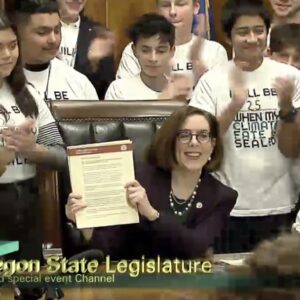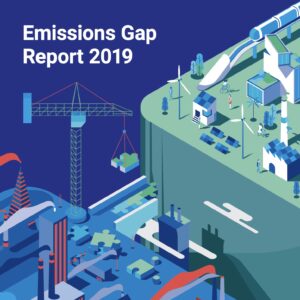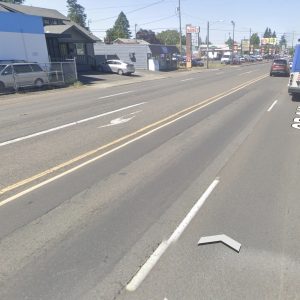
(Photo: Jonathan Maus/BikePortland)
A retired Portland bike shop owner is working to galvanize local awareness and action to move federal climate change legislation forward.
Rich Fein sold Cynergy E-Bikes (3838 SE Powell) at the end of 2020, but he hasn’t slowed down. He’s now working to get Portland bike shops signed onto the Biking Industry Climate Declaration.
The declaration is spearheaded by an arm of the nonprofit Citizen’s Climate Lobby as part of a broader effort aimed at building support for the Energy Innovation and Carbon Dividend Act, a bill introduced into the U.S. Congress in 2019 as H.R. 763. (You might recall our guest post in September from a BikePortland reader and Citizen’s Climate Lobby volunteer.)
Elements of the bill include a carbon fee at the source of all fossil fuels that would be paid out as dividends to Americans.
So far Fein says 11 local shops have signed the declaration supporting the bill:
Advertisement
Fat Tire Farm
River City Bicycles
Clever Cycles
West End Bikes
The E-Bike Store
Cynergy E-Bikes
Cyclepath
Rose City Recumbents
Recumbent PDX
Go By Bike
Nomad Cycles
The declaration is also supported by the National Bicycle Dealers Association.
“The bike industry is in a unique position for taking action on the climate. That’s especially the case for bike dealers, working the front line of our industry,” wrote the NBDA in a statement. “Many of us are serving as energy-saving evangelists, promoting bikes and e-bikes as low-carbon, affordable, healthy transportation.”
In other climate news…
— Portland Congressman Earl Blumenauer is urging supporters to sign a petition that encourages the Biden Administration to declare a climate emergency.
— Portland-based Families for Climate will host a virtual meet-up March 30th with Aaron Brown of No More Freeways and Victoria Paykar, of Climate Solutions.
— The 11th Annual Northwest Climate Conference kicks off April 6th and will include three full days of workshops, panels, networking sessions, and more.
— Jonathan Maus: (503) 706-8804, @jonathan_maus on Twitter and jonathan@bikeportland.org
— Get our headlines delivered to your inbox.
— Support this independent community media outlet with a one-time contribution or monthly subscription.







Thanks for reading.
BikePortland has served this community with independent community journalism since 2005. We rely on subscriptions from readers like you to survive. Your financial support is vital in keeping this valuable resource alive and well.
Please subscribe today to strengthen and expand our work.
I’d love to see an open and honest evaluation of the bike industry on climate change and environmental impacts, specifically the use of strategic metals and toxic materials such as lithium (for batteries on e-bikes), high-impact aluminum smelting, chromium & molybdenum steel alloys (cromoly), plastics in both bike parts and in clothing, the dependence on cheap un-unionized labor both in manufacturing overseas and for our mechanics in the USA, the blatant racism in where and when safe bike facilities are implemented in our country (and where bike shops are located), and a never-ending series of changes to standards in parts (built-in obsolescence) that causes enormous waste of older parts and bikes with most bikes ending up in dumps, along with constant ostracizing and harassment of the chop-shop recyclers in our communities. Our fickle 48 million customers (we is them) are clearly part of the problem.
So, just to summarize:
An open an honest evaluation of the bike industry on: Climate Change and Environmental Impacts.
with specific bullet points on
-use of strategic metals
-use of toxic materials such as lithium(for batteries on e-bikes)
-high-impact aluminum smelting
-chromium & molybdenum steel alloys (cromoly)
-plastics: bike parts, clothing
-the dependence on cheap un-unionized labor both in manufacturing overseas and for our mechanics in the USA
-never-ending series of changes to standards in parts (built-in obsolescence) that causes enormous waste of older parts and bikes with most bikes ending up in dumps
-along with constant ostracizing and harassment of the chop-shop recyclers in our communities
WOULD YOU LIKE SOME CHAIN LUBE WITH THAT?!!??
Something tells me you want to explain all this to the world…
Do you mean as opposed to using wax?
So, it’s the car industry except that the end product uses less than 1% of the material used to make a car?
“most bikes ending up in dumps”: Oh? Based on what factual info? Please link. But really, the relevant answer to just about all of your above is “far less than the motor-vehicle industries.” The more we can do our getting around via the less-offensive industry, the bigger the net gain compared to using the more-offensive industries. But yeah, making the less-offensive industry _even less_ offensive is good too.
Where does your Huffy Next Magna go when it dies, the type of bike that constitutes the vast majority of units sold in the USA (but not by value)?
See, you made the original assertion — so it’s incumbent on you to support with facts, rather than to deflect with a question. Now go ahead and link to a factual answer to your own deflecting question.
A clue: The bike types you have in mind have a lot of steel. So depending on the exact meaning of “_ending up_ in dumps,” there’s this:
“Steel and iron are the most recycled materials in the world due in part to the opportunity to recover large structures as well as the ease of reprocessing. The use of magnets in the sorting process enables recyclers to easily separate them from the mixed waste stream.”
“The collection process for metals differs than that for other materials because of higher scrap value. As such, it is more likely to be sold to scrap yards than sent to the landfill.”
https://www.thebalancesmb.com/an-introduction-to-metal-recycling-4057469
Your article states that only 34% of steel is ever recycled, and of course there’s no mention of bicycles. Basically you are responding to my comment by mentioning meaningless infotainment, distracting us from any meaningful dialog.
This goes to show that if your paragraph is sufficiently big you can put almost anything at the end of it. But hey, I’m with you and will raise the bet: We should give them a warm well-lighted place to do it. (If it’s a business they have to run the serial numbers)
Thank you for writing about this important topic. It seems like climate change does not get discussed nearly enough. I support this policy because it would reduce carbon emissions by 40% in 12 years, while protecting the most vulnerable populations. The fee would actually be placed at the source of all fossil fuels, incentivizing all businesses and individuals to make better/lower carbon choices. This would also open up the market for more renewables and energy efficiency solutions. We can all make personal choices to lower our carbon footprint, but we need national policy to reduce carbon emissions on a large scale.
Carbon fees don’t work unless they apply the fee to imported goods. If it only applies to domestic carbon emissions all the fee will do is drive more production overseas. The carbon fee should actually be applied as a fee on goods or services so that we as consumers know what OUR carbon impact is. Do you heat your house with natural gas? If you do you pay the carbon fee on the energy used. Do you use gasoline? You pay a carbon fee on it. It is very easy to calculate the rough carbon impact of any product you buy by just by weighing the metal and plastic content. Give some of the dividends of the fees back to low income people to make it more progressive but as long as you try to hide the fees by applying them to the manufacturer you are just driving those manufacturers to regions or countries that don’t apply the fees. We have been exporting our pollution to SE Asia for years. The greenhouse gas impact of that 65″ TV is the same regardless of where the parts were produced. If we only apply carbon fees on the parts made here, the parts will just be made elsewhere and but the carbon goes into our common air. WE the consumer need to feel the pain directly of our decisions that impact greenhouse gases.
Hi Jon –
You are absolutely correct. That’s why the Energy Innovation and Carbon Dividend Act includes a border adjustment that increases costs of goods imported from countries that don’t impose a carbon fee. The act even provides subsidies to U.S. exporters trying to sell to countries without a carbon fee. There are several European countries with carbon fees now and the E.U. as a whole will be doing this starting in 2023. It will start with the trading of fuels and carbon intensive products and will expand to other goods from there.
Jon – thank you for brining that topic up. It’s an important one. One element of the Energy Innovation and Carbon Dividend Act is a carbon boarder adjustment fee to prevent companies from moving production overseas and to encourage other countries to adopt carbon pricing. You can read more about this fee here:
https://citizensclimatelobby.org/laser-talks/border-tax-adjustment/. You can also read more about this bill here: https://energyinnovationact.org/how-it-works/
Rich, thanks for your effort to build support for the bill. Just signed the declaration for my shop.
I concur with KentonCycles. Great job Rich!
It’s incredibly depressing that meaningless “emergency” declarations are still a major *focus* of “climate activism”. IMO, these performative campaigns are even more delusional than Paris accord NDCs.
I will be very surprised if the USA takes any meaningful action in addressing ongoing ecocide in the next 9 years.
Is it not in fact an emergency?
Doing the presidential dog-and-pony show enables the part of our government that is not lying about science to move money and push projects that would otherwise not happen until about the time the tide is lapping at Mt. Tabor.
Sure politics is a game. That doesn’t mean we should cede the considerable power and resources of the US government to McConnell et al.
It was just as much an emergency 40 years ago. These performative and “easy” campaigns distract from the sociopolitical political struggle needed to transform our societies. They are akin to passing a “bike plan” and doing @#$% all for decades.